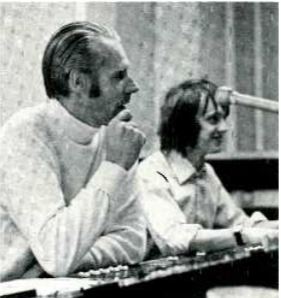
WW: Is it true that Sgt. Pepper was recorded on four-track machines?
GM: Yes, absolutely true. It was done four to four.
WW: Who did the engineering on Sgt. Pepper?
GM: Geoff Emerick, I think he did all of it.
WW: What other Beatles records has he worked on?
GM: I couldn’t give you a catalog—there are quite a few. When we started out, the engineer we had was a guy by the name of Norman Smith. I can’t give you which record he stopped on, but we could find that out easily the facts arc there.
But he came to me one day and said he wanted to be a producer… he was an EMI engineer. . . and did I mind. And I said, “No, fine. Off you go.” He said, “The only thing is, I want to go on engineering the Beatles.” And I said, “Well, now, I don’t think you can do that.” I was very firm, but quite polite, and I said, “If you want to be a producer, that’s one thing and that’s fine. Go and make some good records. I’m sure you can, but I don’t think you can go on engineering at the same time,” which comes back to your previous question.
So he made the plunge and he left and became a producer, and he’s done some extremely good stuff. He made all of the Pink Floyd’s early records. He’s now a staff producer for EMI. But then I had to find another engineer.
Now there were lots of engineers senior to him at EMI, but I decided at that time that I wanted someone very new and young. I’d been looking around—looking for talent, so to speak, and I decided to give the chance to Geoff Emerick, who in fact had done very little recording before. He’d been balancing for six or nine months before I gave him the job with the Beatles. He jumped at that and it was really tossing him over the deep end; but he was marvelous—he came out with colors flying. And after Geoff we used other people as well, but in fact, we brought Geoff back for Abbey Road.
WW: He didn’t, then, work on the Beatles white album?
GM: No, he didn’t.
WW: Would you describe some of the techniques used on Sgt. Pepper, for example on “For The Benefit of Mister Kite”?
GM: That’s really quite simple when you know about it. John wanted a calliope kind of sound. He wanted to get the impression of a fair ground and he played me this song that he’d written, and asked what I could think up to give it that kind of fair ground atmosphere.
And I thought a lot about it, and I decided the best way to do it was to use some of the techniques I’d done with spoken word records. I decided that to get the kind of swooping, steam organ noise he wanted, I got him on one Hammond organ and me on another; actually I think he was on a Lowry and I was on a Hammond.
And we recorded some half speed organ, and I did some chromatic runs with the tremelo on fairly fast over two octaves and then sped them up to double speed. That was one of the things—the swooping noises. But for the background mush, I got lots of steam organ tapes, genuine fair ground organ recordings of all sorts of pieces of music—“Stars and Stripes Forever” and those kinds of things—and cut them into short lengths (of tape) and threw them up in the air, literally, and just told the engineer to pick them up again and join them all together. He thought I was mad.
We played it and of course the result was very cacaphonic. We used that as just a general background, mingling mush, which gave the required effect … all kinds of funny jumping—some of it was backwards—but it worked.
WW: Beatles records are also characterized by constructive use of echo effects. Do you pay particular attention to echo on your recordings?
GM: The right kind of echo, yes. There’s a tendency these days to use plates an awful lot, in fact exclusively. We have plates here but we also have an echo chamber, which I must confess I haven’t used a great deal yet. But I believe that a good chamber can beat a plate any day. I used chamber mainly on Beatles records.
Actually, we used a combination of chamber and tape, which we called “steed”—I don’t know why we called it “steed”—but it was basically sending the delayed signal by means of tape into the chamber.
WW: Why weren’t any of the engineering teams credited until Abbey Road?
GM: EMI policy, and they didn’t like it even then. (Abbey Road)
